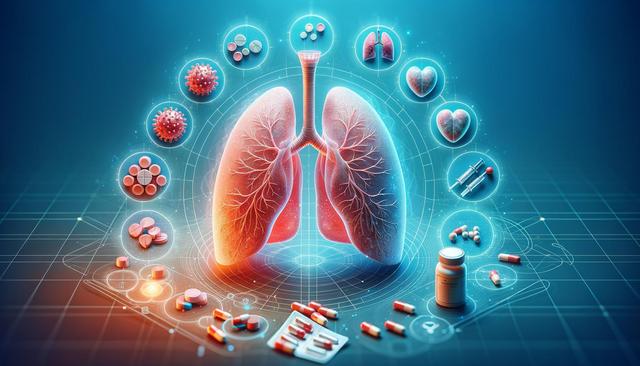Recognizing the Symptoms of Lung Cancer
Identifying the early symptoms of lung cancer can be challenging, particularly because many signs overlap with other common respiratory conditions. However, understanding what to look for can be critical for early detection and better outcomes. Common symptoms include:
- Persistent cough that worsens over time
- Shortness of breath or wheezing
- Chest pain that is often worse with deep breathing or coughing
- Unexplained weight loss or fatigue
- Recurring respiratory infections such as bronchitis or pneumonia
Some individuals may not experience noticeable symptoms until the disease has progressed significantly, which underscores the importance of regular health checks, especially for high-risk individuals such as smokers or those with a family history of lung conditions. If you or someone you know is experiencing any of these symptoms, it is advisable to consult a healthcare provider.
Advancements in Lung Cancer Diagnosis
Traditional diagnostic methods for lung cancer often rely on imaging tests like chest X-rays or CT scans, followed by tissue biopsies. While effective, these techniques can be invasive and may not always be viable for all patients. This is where the Non-invasive Liquid Biopsy for Lung Cancer Mutation Test comes into play. This emerging diagnostic tool uses a blood sample to detect genetic mutations associated with lung cancer, offering a less intrusive option compared to surgical biopsies.
Some benefits of liquid biopsy include:
- Reduced risk and discomfort for the patient
- Faster turnaround time for results
- Ability to monitor treatment effectiveness over time
- Access to genetic information that can guide targeted therapies
This non-invasive method is especially useful in cases where a traditional biopsy is not feasible due to the tumor’s location or the patient’s health status. It is becoming a valuable part of the evolving toolkit for lung cancer management.
Personalized Lung Cancer Treatment Options
Once a diagnosis is confirmed, choosing an appropriate lung cancer treatment plan becomes the next crucial step. Treatment strategies are increasingly tailored to the individual, particularly when genetic mutation data is available from tests like the Non-invasive Liquid Biopsy for Lung Cancer Mutation Test. This personalized approach ensures that the therapy aligns closely with the specific characteristics of a patient’s cancer.
Common treatment options include:
- Surgery to remove localized tumors
- Radiation therapy for targeted destruction of cancer cells
- Chemotherapy to address cancer that has spread
- Immunotherapy to boost the body’s natural defenses
- Targeted therapy based on genetic mutations
Personalized medicine is making it possible to select treatments that are more likely to be effective and less likely to cause unnecessary side effects. This is a significant advancement in improving patient outcomes and quality of life during and after treatment.
The Role of Genetic Testing in Lung Cancer
Genetic testing is rapidly becoming a cornerstone of modern cancer care. In the context of lung cancer, identifying specific mutations helps guide decisions about lung cancer treatment. The Non-invasive Liquid Biopsy for Lung Cancer Mutation Test can identify mutations such as EGFR, ALK, and KRAS, which are often targets for newer, more precise therapies.
This approach offers several advantages:
- Helps predict how a tumor will respond to certain treatments
- Enables oncologists to avoid ineffective therapies
- Assists in ongoing monitoring of tumor evolution
By integrating genetic testing into the diagnostic process, healthcare providers can adapt treatment plans in real-time, making them more responsive to the patient’s changing condition. This dynamic approach enhances the ability to control the disease and improve long-term survival rates.
Living with Lung Cancer: Support and Monitoring
Managing life with lung cancer extends beyond diagnosis and treatment. Ongoing support, education, and monitoring are essential. Patients often benefit from a well-rounded care team that includes oncologists, pulmonologists, nutritionists, and mental health professionals. Monitoring for recurrence or progression is also crucial, and tools like the Non-invasive Liquid Biopsy for Lung Cancer Mutation Test make it easier to perform this monitoring with minimal discomfort.
Support strategies may include:
- Regular follow-up appointments to track progress
- Mental health counseling and support groups
- Diet and exercise plans tailored to patient needs
- Patient education on managing side effects
Living with lung cancer can be challenging, but with the right support system and access to modern diagnostic and treatment tools, patients can navigate their journey with greater confidence and clarity.
Conclusion: Embracing Innovation in Lung Cancer Care
For individuals facing lung cancer, the journey can be daunting, but innovations like the Non-invasive Liquid Biopsy for Lung Cancer Mutation Test are making a meaningful difference. By helping detect genetic mutations through a simple blood test, this technology supports earlier diagnosis, more personalized treatment options, and continuous monitoring. When combined with an understanding of the symptoms of lung cancer and access to comprehensive lung cancer treatment plans, patients are better equipped to manage their health. Staying informed and proactive is key to navigating this complex disease with resilience and hope.




Leave a Reply